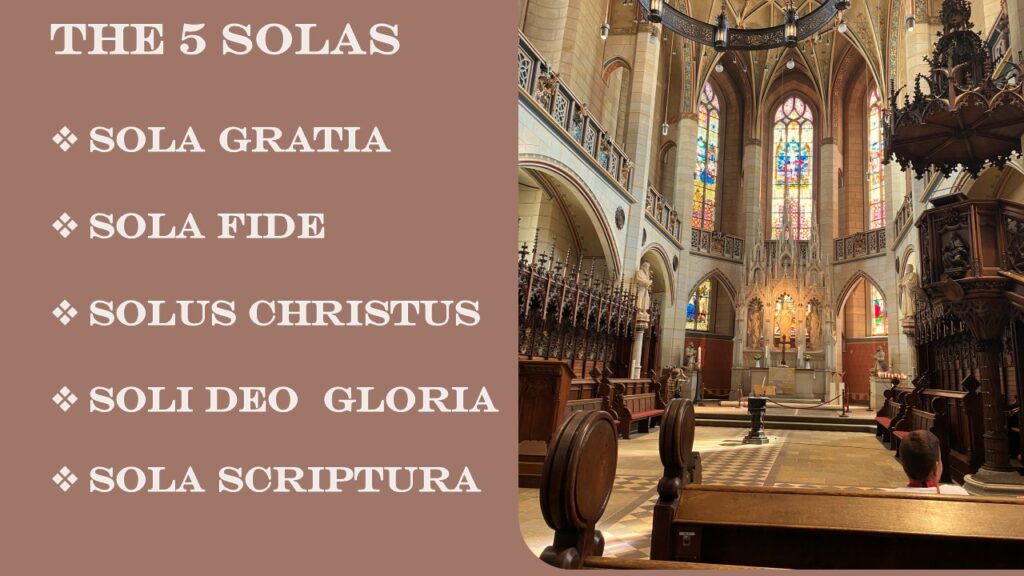When the Quiet Part Is Said Out Loud: Our Journey to Disaffiliation from the ELCA

There were three linchpins that were integral to my departure from the ELCA. The first linchpin, the so-called “Bound Conscience” statements, kept me from leaving the ELCA for over 15 years with the belief in the lie that the ELCA was some kind of “big tent,” with room purposely made for biblical conservatives along with progressives. It was, of course, a lie intended to stop the mass exodus of conservatives and others, but it was convenient for me to believe and promote. I told myself that as long as I could preach and teach from a biblically conservative and confessional theological position without interference, I would remain in the ELCA. Why risk damaging a church when there was no interference or pressure? As the years went on, this self-deception wore thin and I felt less and less welcome and safe in the ELCA.
This Bound Conscience (BC) linchpin was exposed and readied for pulling at the 2022 Churchwide Assembly, when it was decided that BC needed to be “reconsidered.” Conservatives who already had diminished trust levels in the ELCA interpreted this as meaning that BC would be neutered or eliminated. When asked about what this meant, we were typically told that the language would be “updated,” “aligned with current understanding of issues,” or even “aligned with Federal DEIA guidelines” (except when it was pointed out that DEI was being eliminated throughout the federal government).
It took me a long time to understand that the phrasing of BC as “Conscience Bound Belief” was itself actually a trap. Scripturally conservative pastors and believers would never say that we were “conscience-bound” to a belief. We would rather say that, like Martin Luther, our conscience is bound to the plain language of Scripture. Our consciences are not simply bound to an easily dismissed social construct. Even with this problem, BC provided at least some legal and denominational cover for conservatives, while being incredibly offensive to progressives.
The concept of Bound Conscience as an important factor for conservative pastors and churches was difficult to explain to the lay people in my congregation. None had heard of it. Explaining it and what the loss of it would mean to conservative pastors and churches was critical in preparing my congregation for disaffiliation.
The second linchpin in my disaffiliation journey was the work of the Commission for a Renewed Lutheran Church (CRLC). This is where the “quiet part was said out loud.” I was providing sound and video support for a pastors’ conference in 2023 where I got to hear first-hand what they were planning to do to the denomination. I have never felt so unwelcome and unsafe in my entire ministry. It was as though I had fallen into a DEIA-based cult, where Jesus wasn’t really needed and scripture was only quoted to make what was being done sound vaguely religious, or to confuse anyone who dared object to anything being proposed, all presented with this kind of sanctimonious smirk intended to intimidate or shame any who disagreed. After three days of listening to their plans, I knew I had to get out of the ELCA prior to the 2025 Churchwide Assembly. There absolutely was no place for a conservative pastor – or church – in the ELCA.
If there was any doubt about my concerns, they were put to rest when the final report of the CRLC was released by the ELCA Church Council. It was so much worse than I had understood. DEIA, along with anti-racism and Critical Race theory, were now to be the central “operating system” of the ELCA, and it was now in writing. I was surprised to see that much of what the CRLC was proposing was already approved through Continuing Resolutions (requiring no vote) or was being passed on for approval. The fix was already in and the traps to catch conservative pastors and churches were now set.
Walking my congregation through this very well constructed maze of traps was interesting. It all assumed that, of course, DEIA was in place and would be implemented on every level: Churchwide, Synodical AND in congregations. The problem was that congregations still had some level of autonomy. Much of the CRLC’s plan involved implementing DEIA policies fully in congregations and congregation councils. Plans were put in place to do that, but congregation constitutions needed to be brought into line with the Churchwide and Synodical constitutions, and to do that, a constitution convention would need to be held. That wasn’t approved at the 2025 Churchwide Assembly, but all of the groundwork had been done to implement DEIA, CRT, anti-racism and all the rest of it fully into every aspect of the ELCA. For a more complete discussion on this, click here to see my Lutheran CORE article from July of 2024.
The last linchpin in my journey was the results of the ELCA’s DEIA audit that has been on the ELCA’s website for some time (found here and here ). It’s in two parts and has largely been adopted for implementation along with the CRLC’s final proposals. The DEIA audit is another fascinating “saying the quiet part out loud” document that is so disrespectful of conservative pastors and churches, literally mandating DEIA policies and training for all pastors and church councils. It’s breathtaking in its scope, and it describes the tenuous autonomy that congregations have as an obstacle to the full implementation of DEIA policies.

With all three of these linchpins about to be pulled, the wheels are about to fall off of the ELCA, at least with regard to all conservative pastors and churches. How? It’s a really clever trap. There is, as ELCA representatives insist, no directly stated threat to congregational autonomy. There is no “Do this or else” language. However, if a congregation or pastor refuses to adopt and implement these policies, they will be branded as sexist, racist and misogynist, and put under discipline or removed for failing to fall in line. When there is a pastoral transition, congregations will only be given candidates chosen to bring them back in line with current ELCA DEIA polity, or worse, given interim pastors whose job it is to weed out the “problems” with the church. And conservative pastors? Good luck with mobility or support. Any refusal to go along with the progressive agenda will be viewed as hate speech. See this video of a SWCA synod council member doing just that to motivate the 2023 synod assembly into voting to put a congregation under synodical preservation.
What Our Disaffiliation Process Looked Like
With the very helpful advice of the Lutheran Congregational Support Network YouTube videos (here) we focused ONLY on the issue of congregational autonomy. I was heading in this direction on my own, but this really helped clarify the issue. The “big tent” lie, while still being promoted by the ELCA, is easily dismissed as a manipulative tactic to keep churches from leaving. The question for me is simply, “Are conservative pastors and churches Welcome and Safe in the ELCA?” That phrase, “Welcome and Safe,” became my main emphasis as I worked to educate my congregation. If you focus on DEIA or LGBTQIA issues, you end up in endless, circular and manipulative arguments that the ELCA is very well prepared to win, or at least, to distort the issues and gaslight people into confusion. Focusing on the congregation autonomy question is the only route to take, and it is easily understood and grasped by congregation leaders and members.
Once I understood fully what was coming and what the issues were, I began the education process in my congregation – first with the council leadership, then with broader leadership, and then with the congregation as a whole. Education and information are key. Members have to fully understand the issues.
The first vote we took was with the church council, moving to ask the congregation to vote on whether we should begin the disaffiliation process at the congregation’s annual meeting. That passed unanimously.
The next vote was at that annual meeting, to decide to move forward with the disaffiliation process. There we set the official disaffiliation vote dates according to the ELCA’s model constitution for congregations. This also passed at over 95%.
Even though our formerly ALC congregation was operating under a church constitution from 1977 (!), I decided to follow the ELCA’s current process guidelines for former ALC congregations to the letter. This made little difference to us, and it removed an ELCA objection point.
It’s important to note that we engaged a conservative Christian legal firm (Tyler Law, LLP, out of Murietta, CA) to walk us through the process. Even though I was confident that I understood the process, I wanted legal backing to make sure I wasn’t missing something. I wasn’t. A representative from the firm was present at each of the two mandated disaffiliation votes to verify that the process was conducted properly, and all correspondence went through our legal firm. We had used this firm before for issues with the City of Los Angeles and some HR issues. The total legal cost to us for this process was just over $11k. I would not recommend going into this process without a legal team.
I can’t stress enough the importance of fully preparing the congregation for disaffiliation, making sure they understand completely what the issue really is. Because my congregation was well-prepared, both votes were above 95% in favor of disaffiliation. The Bishop’s Consultation meeting actually solidified the results.
Because I had a good working relationship with the current and previous synodical bishops (I provided a lot of sound and video support for them, as well as serving as a Conference Dean for many years – and having served in this synod for 32 years), the process was not contentious or adversarial. I understand that this is probably the exception rather than the rule as these things go. I do feel utterly cut off from former friends and colleagues in the synod, however. That seems par for the course.
In this disaffiliation process, I prepared extensive documentation and educational materials for my congregation. I am happy to share these with pastors or congregations considering this process. Just email me with your questions and concerns. I am also open to phone conversations on this.
Our congregation is now a part of the North American Lutheran Church (NALC). We are now a part of an organization that truly honors Scripture and the Lutheran Confessions. It feels like we came home.










